Bedework Visits Europe
Gary Schwartz, February 2008
When Bedework received a Mellon Award for Collaborative Technology (MATC) in December 2006, our draft budget projection included a line for "Meeting with European developers."
In November 2007, Mike Douglass and I traveled to Europe – England, Denmark, Sweden and Spain, to be specific, along with Dave Thewlis, the Executive Director of CalConnect, to meet with European developers.
Our itinerary from November 7 through 17 looked like this:
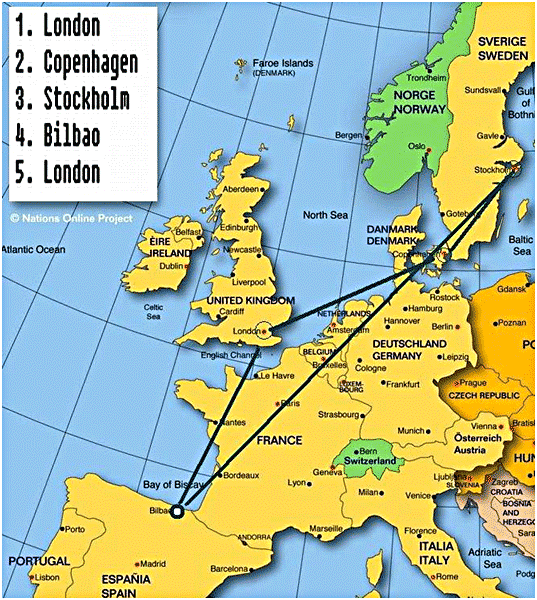
We had meetings at the Rutherford Appleton Laboratory (RAL), the Danish National IT and Telecom Agency, Stockholm University, the Public University of Navarra (Pamplona, Spain).
Before briefly describing the technical component of our meetings, I need to acknowledge the generous and gracious hospitality of all our hosts. We felt very welcome, and we are genuinely appreciative to have been received so warmly. Additionally, we were extremely impressed with the work being done, both in the calendaring space, and in other technical areas.
In London, we met with Chris Dudding to discuss some CalConnect related issues, and also to discuss mobile device directions and futures. Chris is an architect with Symbian.
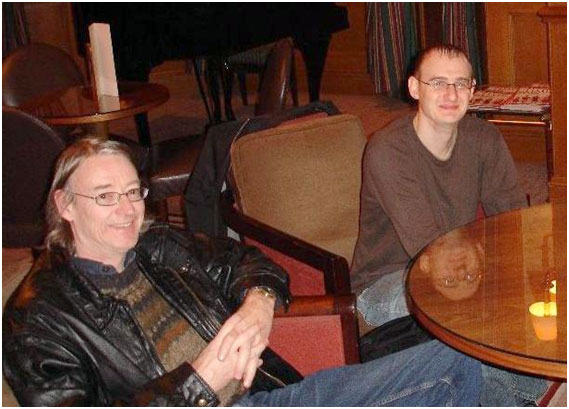
At Rutherford Appleton Laboratory (RAL), we met with the JISC Services Communications Group who have a very interesting use case of combining calendaring with mailing lists. Shibboleth integration is a requirement, as we heard again in Stockholm. We would like to thank Penny Windebank, JISCmail director and her team for allowing us to visit with them.
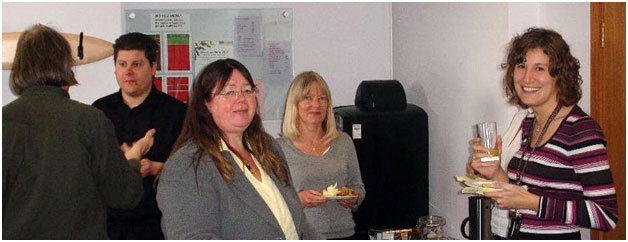
In Copenhagen, we attended a meeting sponsored by the Danish National IT and Telecom Agency (IT & Telestyrelsen). We were there to discuss their ekalender.dk project, a component of their larger e-government project. Cabo Communications, a Danish IT firm which did much of the work on ekalender, also participated. XML, not surprisingly, plays a large role in the e-government initiative, and dovetails nicely with a new CalConnect initiative to come up with a standard XML representation of iCalendar data. This meeting, which was under the auspices of CalConnect, resulted in a reciprocal visit and presentation by members of the ekalender.dk team (which can be found at http://calconnect.org/presentations.shtml), Bitten Clausen & Helle Martinussen from the Danish government, and Christian Orellana, Claus Albøge, and Steffen Furholm from Cabo Communications.
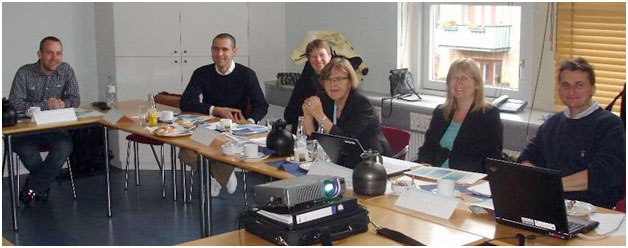
Mattias Amnefelt hosted our visit to Stockholm University. Stockholm is presently working on refactoring some of the UI code, which we will be integrating back into the Bedework distribution. We lunched with Mattias and some of his Stockholm University colleagues, and also with Emil Lundberg of Uppsala University.
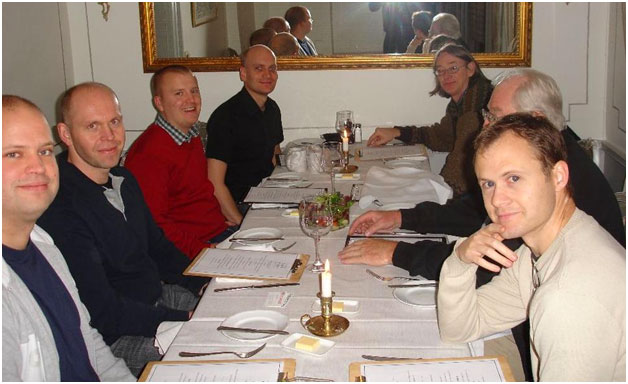
After our first day in Stockholm, Mike left for Spain, and Dave Thewlis and I stayed on an additional day.
In the morning, Dave and I met with some prospective CalConnect members.
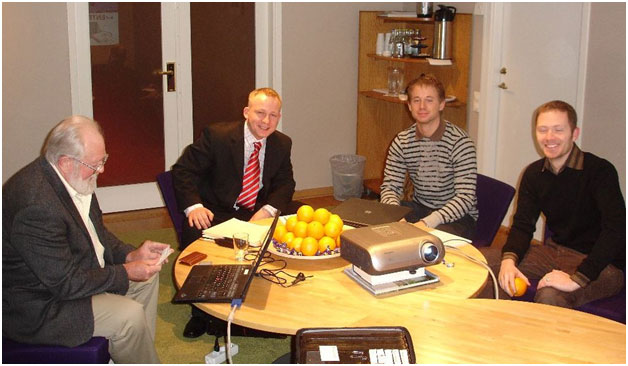
In the afternoon, Mattias had arranged for us to present at the Sunet Trefpunkt conference, a meeting for the Swedish University Network's technical reference group. Dave presented “Calendaring Interoperability and Calendaring Standards”, and I followed with “Interoperable Calendaring Where we are, where we're headed and why it matters”. We were a little nervous as we were filling in for a Google guy who had canceled. We were the last presentation of the day, following a talk about global warming. Even in Swedish, global warming sounded pretty ominous. Nonetheless, the attendees received us very graciously. The presentations are available at the CalConnect presentations page, http://calconnect.org/presentations.shtml, and videos are found at http://www.compodium.se/trefpunkt17/.
Subsequent to our visit, Stockholm University joined CalConnect, and we had a chance to meet with Mattias again at the CalConnect Roundtable earlier this month, hosted by Sun in Menlo Park.
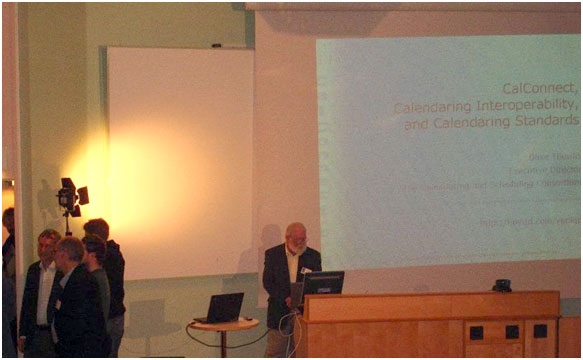
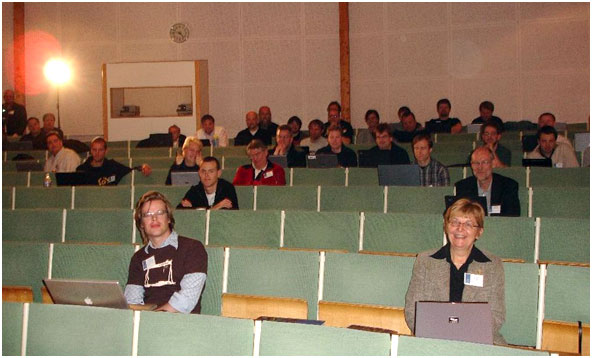
Ana Rodríguez Mazquiarán and Carlos Alonso Vega were our hosts at the Public University of Navarra. Although everyone who met with us made us feel very welcome, we were not prepared for the exceptional hospitality we received at Navarra. Mike and I met with Julio Lafuente López, the rector (president) of the Public University of Navarra, and discussed open source software. Navarra already run Bedework. In fact they run two instances, as they are required to provide content in both Spanish and Basque. We met with them to better understand their issues and experience with localization/internationalization.
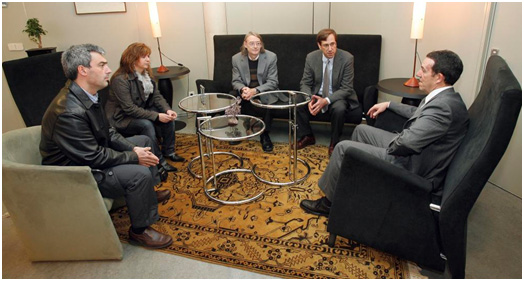
So, what did we learn from our whirlwind trip?
- If you are feeling cynical about the world, your work, anything, take a trip like this one. We came away feeling incredibly upbeat about people, and the work being done in IT.
- Europe is probably more standards driven than the US, although which standards and which standards bodies they are interested in may not be the same as for those of us in the US.
- Europe seems more receptive and interested in open source, than the US.
- Internalization/localization are paramount issues in many countries. The calendaring standards do not offer rich enough support.
- We were surprised by which commercial calendaring products had significant market share (or not) in various countries. We had simply assumed the same products would be leaders in Europe as in the US. That does not appear to be the case, except in the case of Outlook. Everyone is interested in Outlook interoperability.
- Bedework support for standards, localization, and federated identity/authentication will be significant factors in to what extent Bedework is adopted in Europe.
- Lastly, but perhaps most importantly, there is no substitute for meeting with people face to face. It does so much to promote understanding and to facilitate communication and collaboration in the future.

